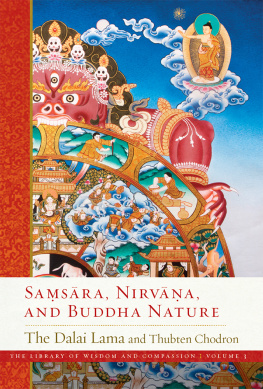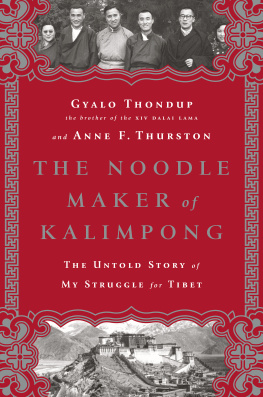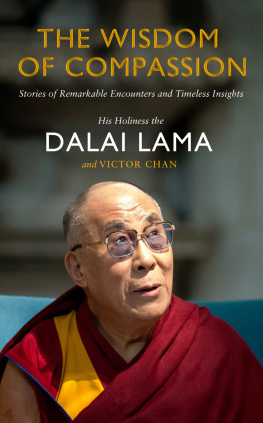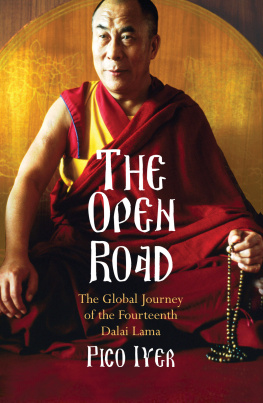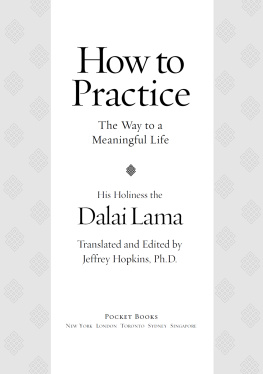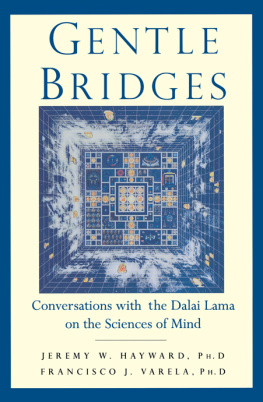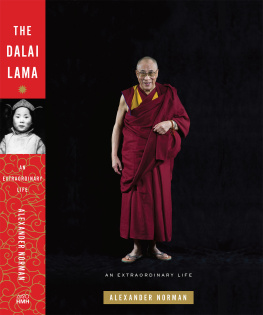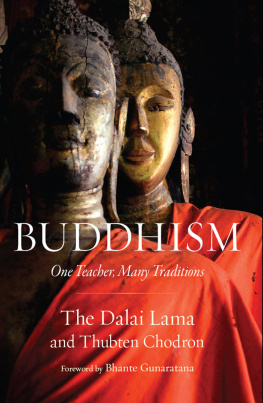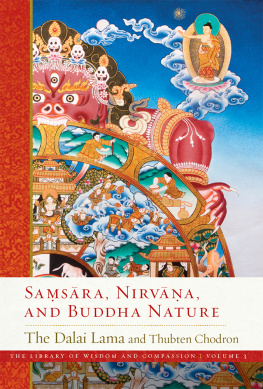Dalai Lama XIV Bstan-ʼdzin-rgya-mtsho - Samsara, Nirvana and Buddha Nature
Here you can read online Dalai Lama XIV Bstan-ʼdzin-rgya-mtsho - Samsara, Nirvana and Buddha Nature full text of the book (entire story) in english for free. Download pdf and epub, get meaning, cover and reviews about this ebook. City: Somerville;MA;USA, year: 2018, publisher: Wisdom Publications, genre: Religion. Description of the work, (preface) as well as reviews are available. Best literature library LitArk.com created for fans of good reading and offers a wide selection of genres:
Romance novel
Science fiction
Adventure
Detective
Science
History
Home and family
Prose
Art
Politics
Computer
Non-fiction
Religion
Business
Children
Humor
Choose a favorite category and find really read worthwhile books. Enjoy immersion in the world of imagination, feel the emotions of the characters or learn something new for yourself, make an fascinating discovery.
- Book:Samsara, Nirvana and Buddha Nature
- Author:
- Publisher:Wisdom Publications
- Genre:
- Year:2018
- City:Somerville;MA;USA
- Rating:4 / 5
- Favourites:Add to favourites
- Your mark:
- 80
- 1
- 2
- 3
- 4
- 5
Samsara, Nirvana and Buddha Nature: summary, description and annotation
We offer to read an annotation, description, summary or preface (depends on what the author of the book "Samsara, Nirvana and Buddha Nature" wrote himself). If you haven't found the necessary information about the book — write in the comments, we will try to find it.
Dalai Lama XIV Bstan-ʼdzin-rgya-mtsho: author's other books
Who wrote Samsara, Nirvana and Buddha Nature? Find out the surname, the name of the author of the book and a list of all author's works by series.
Samsara, Nirvana and Buddha Nature — read online for free the complete book (whole text) full work
Below is the text of the book, divided by pages. System saving the place of the last page read, allows you to conveniently read the book "Samsara, Nirvana and Buddha Nature" online for free, without having to search again every time where you left off. Put a bookmark, and you can go to the page where you finished reading at any time.
Font size:
Interval:
Bookmark:
SASRA, NIRVA, AND BUDDHA NATURE
Sasra, Nirva, and Buddha Nature is the third volume in the series of books coauthored by Venerable Thubten Chodron and His Holiness the Dalai Lama. This has proven to be a remarkable partnership, producing lucid, accessible articulations of Buddhadharma and demonstrating the relevance of philosophy to practice. The present volume ably advances the project begun in the first two volumes and expands its scope enormously. His Holiness and Ven. Thubten Chodron together set out a comprehensive vision of the nature of sasra and nirva, of the Buddhist understanding of the nature of mind, and of the path to liberation grounded in the realization of our buddha nature. The philosophical analysis is precise and comprehensive. The application to personal practice is insightful, direct, and easy to apply. This is a wonderful example of how Buddhist philosophy and Buddhist practice can be integrated.
Jay L. Garfield, Doris Silbert Professor in the Humanities, Smith College and Harvard Divinity School
This third volume in the Wisdom Publications series The Library of Wisdom and Compassion presents an in-depth examination of the idea of buddha nature and explores and illustrates how the mind itself serves as the basis for both our suffering and our liberation. Helpful reflections throughout the text guide our journey. These are truly textbooks tailored for our times.
Jan Willis, author of Dreaming Me: Black, Baptist, and Buddhist One Womans Spiritual Journey
This third volume of the marvelous Library of Wisdom and Compassion series provides an exploration of sasra the painful cycle of unenlightened existence as well as its causes and how to attain freedom from it. The final sections contain a beautiful elucidation of the nature of the mind and its potential buddha nature signifying that every living being has the ability not only to be free of suffering and its causes but also to attain full awakening. The material in this volume is invaluable for those who sincerely wish to understand the Buddhist path and begin following it.
Venerable Sangye Khadro, author of How to Meditate
The Library of Wisdom and Compassion is a special multivolume series in which His Holiness the Dalai Lama shares the Buddhas teachings on the complete path to full awakening that he himself has practiced his entire life. The topics are arranged especially for people not born in Buddhist cultures and are peppered with the Dalai Lamas unique outlook. Assisted by his long-term disciple, the American nun Thubten Chodron, the Dalai Lama sets the context for practicing the Buddhas teachings in modern times and then unveils the path of wisdom and compassion that leads to a meaningful life, a sense of personal fulfillment, and full awakening. This series is an important bridge from introductory to profound topics for those seeking an in-depth explanation from a contemporary perspective.
Volumes:
1. Approaching the Buddhist Path
2. The Foundation of Buddhist Practice
3. Sasra, Nirva, and Buddha Nature
More volumes to come!

The publisher gratefully acknowledges the generous help of the Hershey Family Foundation in sponsoring the production of this book.
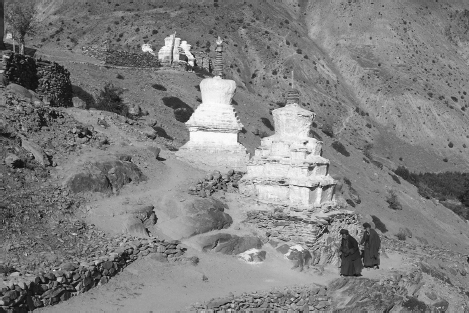

T HE FIRST VOLUME of The Library of Wisdom and Compassion , Approaching the Buddhist Path , explored the Buddhist view of life, mind, and emotions. It provided historical background, introduced us to a systematic approach to the spiritual path, and discussed how Buddhist ideas could pertain to contemporary issues. The second volume, The Foundation of Buddhist Practice , discussed gaining nondeceptive knowledge, rebirth, spiritual mentors, and how to structure a meditation session. From there we considered the essence of a meaningful life and karma the ethical dimension of our actions. If we use our lives wisely and make good ethical decisions, our deaths will be free from regret and fear. Having fortunate rebirths in the future, we will have conducive circumstances to continue our spiritual practice.
A fortunate rebirth is definitely desirable, but it is still within cyclic existence ( sasra ), bound by ignorance, afflictions, and polluted karma. The unsatisfactory circumstances ( dukha ) of sasra are immense and, knowing that, we seek to free ourselves from it. To do so, we must know its causes and whether those causes can be ceased. When convinced the causes can be stopped, we learn the path to eradicate them. Knowledge of guideposts along the way is helpful, as is continuously keeping our goal the genuine peace and freedom of nirva for all living beings in mind. Self-confidence and joyous effort are good friends on our journey to buddhahood.
While ostensibly this volume is about sasra and nirva, it is actually about our minds our minds that are sometimes tumultuous and at other times peaceful. Although our minds are always with us and are the basis of designation of the person, I, our minds remain a mystery to us. How can it be both the basis for the extreme dukha of sasra and the incredible bliss and fulfillment of nirva?
Knowledge of the two types of buddha nature answers this question. One is the naturally abiding buddha nature the emptiness of inherent existence of our minds which has always been and will always be the ultimate nature of our minds. The second is the transforming buddha nature the mind whose continuity goes on to awakening but at present is not yet freed from defilement. This mind serves as the basis for the emptiness that is the naturally abiding buddha nature. These two types of buddha nature are already present within us. The afflictions are not embedded in our minds; our minds are obscured by defilements but are not the nature of defilement. These obscuring factors can be forever eliminated by applying suitable antidotes.
This buddha nature is an indelible part of us. Each sentient being has it, so no matter how low we or others may fall as a result of our afflictions, afflictions and suffering are not our nature. We are worthwhile beings who deserve happiness. Our buddha nature can never be lost and we do not need to prove ourselves to anyone. The unpurified mind is sasra; the purified mind is the basis of nirva. All that is needed is our confidence and sincere effort to follow the path, purify our buddha nature, and cultivate awakened qualities. These are the topics of the present volume.
The prefaces of volumes 1 and 2 Approaching the Buddhist Path and The Foundation of Buddhist Practice contain longer explanations of the origin of the Library of Wisdom and Compassion. To give a brief account, it began with my requesting His Holiness in 1995 to write a short text on the stages of the path ( lamrim ) that lamas could use when teaching serious students new to Buddhism. Much to my surprise, His Holiness responded by saying that a larger book needed to be compiled first. Because the existing lamrim texts are excellent, there was no need to repeat them. This book needed to be different: It must contain material from the philosophical treatises so that readers will gain a deeper and more detailed explanation of the important points. It must contain material from the Pli Buddhist tradition so that Tibetan Buddhists will have a more expanded view of the Buddhas teachings that will lessen sectarianism and help students to appreciate the Buddhas remarkable skill and versatility in instructing people with diverse interests, aptitudes, and dispositions.
Font size:
Interval:
Bookmark:
Similar books «Samsara, Nirvana and Buddha Nature»
Look at similar books to Samsara, Nirvana and Buddha Nature. We have selected literature similar in name and meaning in the hope of providing readers with more options to find new, interesting, not yet read works.
Discussion, reviews of the book Samsara, Nirvana and Buddha Nature and just readers' own opinions. Leave your comments, write what you think about the work, its meaning or the main characters. Specify what exactly you liked and what you didn't like, and why you think so.

